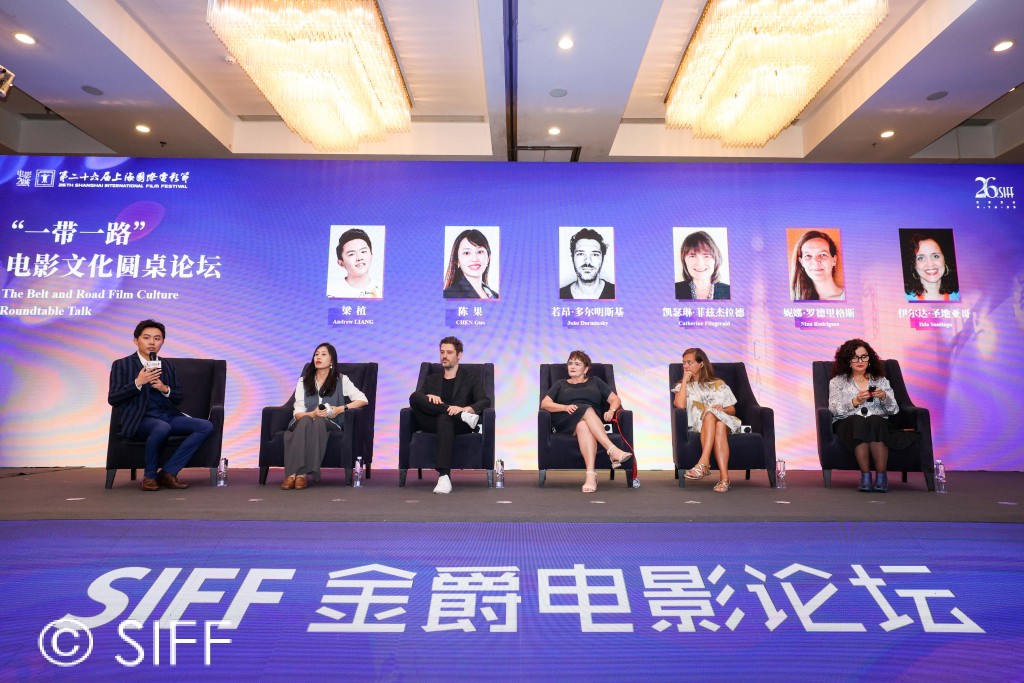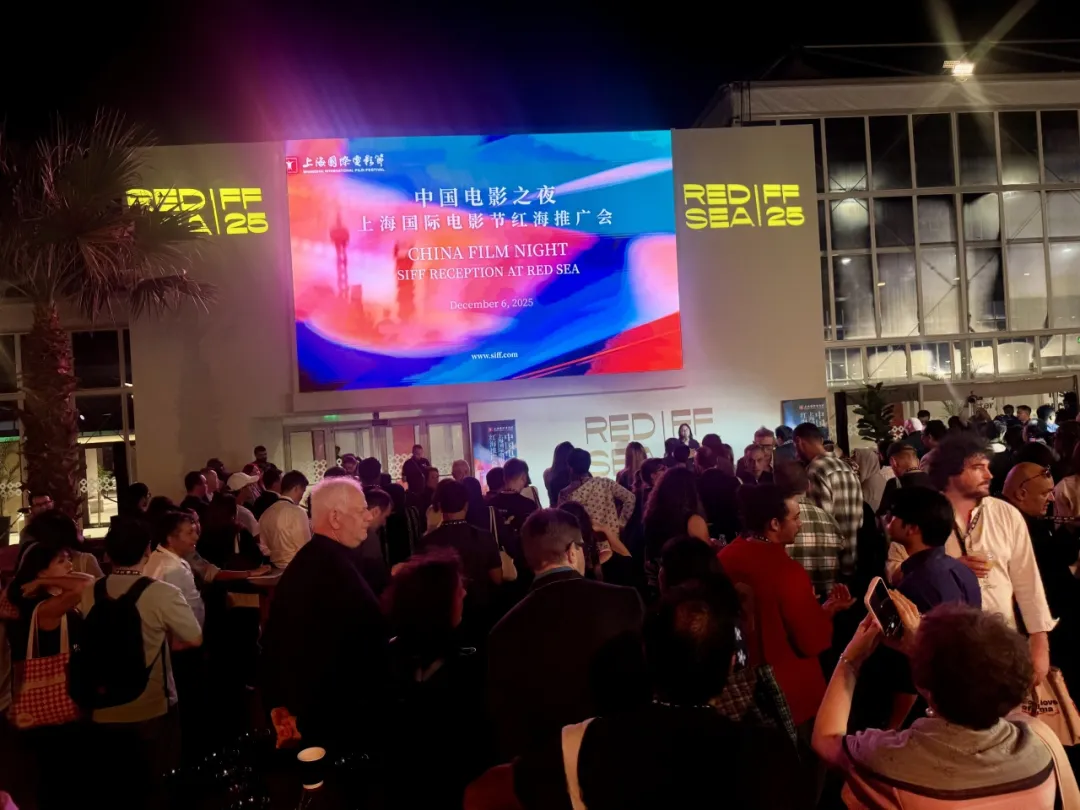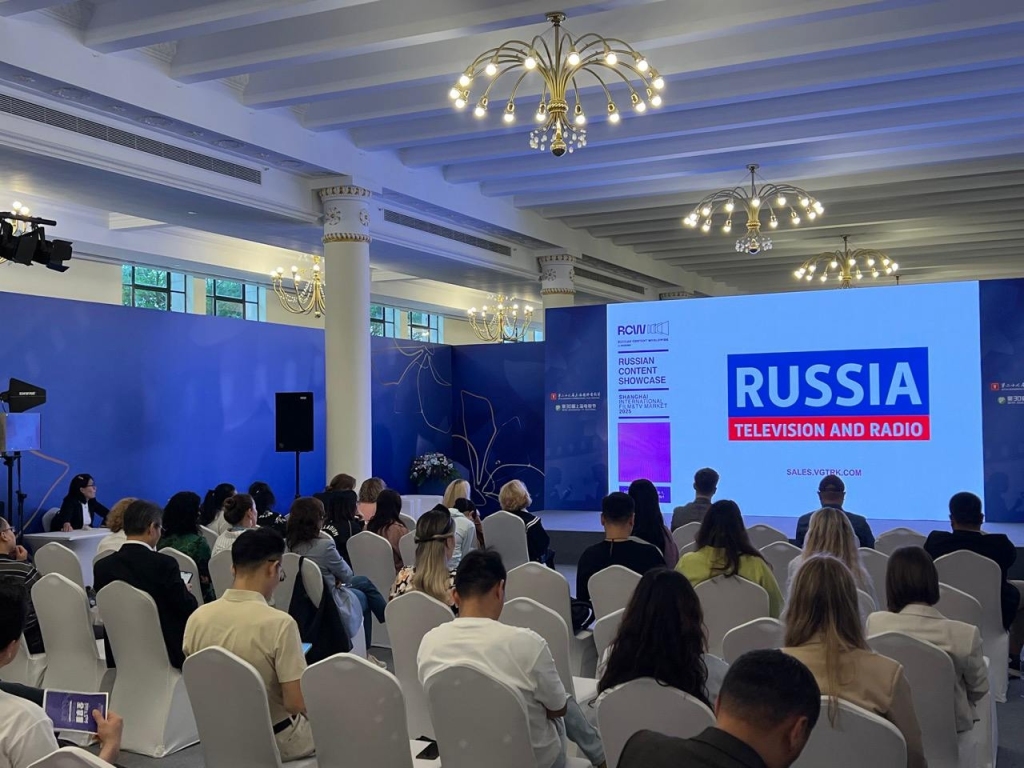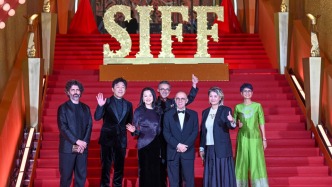
Every year, the Shanghai International Film Festival’s “Belt and Road” Film Culture Roundtable Forum builds such a valuable platform, bringing together guests from the “Belt and Road” Film Festival Alliance with producers, directors, film scholars, etc., inviting them to talk about the myriad aspects of hosting and participating in film festivals, share experiences, exchange ideas, and truly carry forward the spiritual core of the “Belt and Road” initiative that conforms to the multipolarization of the world and cultural diversity.
The Belt and Road Film Culture Roundtable Forum held on the afternoon of June 16 invited many professionals to attend as in previous years. In the first half of the forum with the theme of "Diverse Film Festivals, Cultural Symphony", the guests participating in the discussion included João Dorminski, Executive Director of the Porto Fantastic Film Festival in Portugal, Catherine Fitzgerald, Director of the New Zealand International Film Festival, Nina Rodriguez, Curatorial Director of the Guanajuato International Film Festival in Mexico, Ilda Santiago, Curatorial Director of the Rio Film Festival in Brazil, and Chen Guo, Director of the Shanghai International Film and Television Festival Center, a total of five behind-the-scenes promoters of film festivals from five continents. In the second half of the forum with the theme of "Humanistic Exchange, Cultural Bridge", the guests included writer and director Hong Ying, producer Liu Hui, Professor Ishikawa of Shanghai Theatre Academy, and young director Zhang Yudi, who shared their experiences and feelings of attending the film festival in person.

Forum site
The film festival allows audiences to look at the current state of the world from a new perspective
In the discussion themed "Diverse Film Festivals, Cultural Symphony", the guests first talked about the film selection criteria of their respective film festivals. Chen Guo, director of the Shanghai International Film and Television Festival Center, said that in recent years, the Shanghai International Film Festival has been committed to increasing the proportion of world premieres and international premieres in the films screened. According to her, among the 461 films screened during this year's film festival, more than 110 were world premieres and international premieres. "It can be said that the high proportion of premieres constitutes the basis of our entire film list this year."
João Dolminski, executive director of Portugal's Porto Fantastic Film Festival, said, "We pay great attention to young directors, so our application mechanism is completely open and free of charge." In addition, cooperation with colleges and universities and the selection of short films are also the highlights of the Porto Fantastic Film Festival. In addition, the festival has also opened a special "Orient Express" unit for Asian films.
Dolminski revealed that the film selection mechanism of the Porto Fantastic Film Festival is inseparable from the origin of the film festival. The film festival was originally founded by his parents, who are die-hard movie fans, "a bit like a family business." "Therefore, we want to create an atmosphere of a big family and make everyone who comes to the film festival feel at home."
Catherine Fitzgerald, director of the New Zealand International Film Festival, said that based on New Zealand's special geographical location, she hopes to build the New Zealand International Film Festival into a bridge between Asian, American and European film cultures, "bringing together all different perspectives."
Nina Rodriguez, curatorial director of the Guanajuato International Film Festival in Mexico, revealed that they had formed a team of up to 30 people to select films. "The concept of our film festival is to allow everyone who wants to participate to participate, and it is very inclusive; and we absorb all kinds of works, even videos shot with non-professional equipment."
Ilda Santiago, the curatorial director of the Rio Film Festival in Brazil, admitted that they would carefully seek a balance between the works of young filmmakers and those of master directors when selecting films. "If you ask the audience what kind of films they want to see most, they definitely want to see some popular films that are shown at larger film festivals. The challenge of our film selection is how to respond to the audience's curiosity and bring them some other films so that they can further examine the current situation of the world from a new perspective through these works."
When talking about what characteristics they want to create for the film festival, all the promoters behind the scenes emphasized that they hope to create a film carnival atmosphere and broaden the horizons and appreciation of domestic audiences through holding film festivals. For this reason, the arrangement of the viewing time and location of the Guanajuato International Film Festival in Mexico is particularly flexible. Movies will be shown from 10 am to 2 am, not only in cinemas, but also in many open-air venues and even cemeteries.
Hilda Santiago emphasized: "We will go out of our way to find some good works. Audiences may not have thought of watching those movies before, but we rely on the film festival platform to give them the opportunity to be exposed to them and leave a deep impression." She also believes that the film festival should also be a platform for industry exchanges, so she is happy to overcome the distance barrier and travel from Rio to participate in the Shanghai International Film Festival. "We have the opportunity to learn about the local film industry, which I think is a very good experience. I am also very happy to come to the Shanghai International Film Festival this time. Although it took a 35-hour flight, I think it's great to be here. I can watch the films screened, and I can also communicate with filmmakers and find new connections."
As for the Shanghai International Film Festival, Fruit Chen said that she would focus on three aspects: first, to provide an opportunity for filmmakers from around the world to gather together, and to promote the development of film as an art form and industry through a professional platform; second, to allow more movie fans to gather in Shanghai and see the best works from different countries (she specifically mentioned that 30% of the ticket-buying audience this year came from outside Shanghai); third, to allow people living in Shanghai, the "city of movies", to enhance their sense of happiness. Even if they are unable to go to the cinema during the film festival for various reasons, they can still feel the warm atmosphere, "making the Shanghai International Film Festival a festival for all citizens."
The Belt and Road Film Festival Alliance helps Chinese films go global
According to Chen Guo, since its establishment in 2018, the Belt and Road Film Festival Alliance has grown from 31 alliance members in 29 countries to more than 55 alliance members today. During the Belt and Road Film Week, Chinese audiences can not only enjoy the latest film works from countries along the Belt and Road, and appreciate the different local customs and cultural heritage of various places; there are even cases like the Lebanese film "Capernaum" that can be screened in mainstream Chinese theaters and achieve commercial success. On the other hand, we Chinese filmmakers have also gone abroad through the platform of the Belt and Road Film Festival Alliance Tour to tell the "Chinese story" to the outside world. In January this year, 17 Chinese films were specially screened at the Dhaka Film Festival in Bangladesh, which were welcomed by local audiences.
In the second half of the forum with the theme of "Humanistic Exchange, Cultural Bridge", Hong Ying, who went from being a writer to directing the film "Moonlight Warrior", shared her feelings about participating in the Dhaka Film Festival. "Dhaka is really very poor. I was born into a poor family, so I have a special affection for poor people and poor places. There is not even a good screening venue in the local area. They screen in museums and use very poor equipment. But it doesn't matter, because in Dhaka, you can feel people's love for movies." Hong Ying added, "We have a lot of disappointment, resentment and dissatisfaction with the world, so we use movies to express ourselves, and then we can find the life and dreams we want in movies. This is also the reason why we come to the film festival."
"Daocang", directed by young director Zhang Yudi, which presents the growth process of a young Peking Opera actor, was shortlisted for this year's "Belt and Road" Film Week. This is her first feature film, and she also shared her feelings about attending a film festival as a director for the first time. "Everyone is concerned about the film itself. This atmosphere is very touching for all filmmakers. You will really be moved by everyone's enthusiasm for the film on the scene." Zhang Yudi said, "I have listened to a master class by director Zhang Yimou before. He said that the applause of the audience at the film festival can change the life of a new director. For me, participating in the film festival is also a very important experience. It can give me the strength to continue filming."
The Umbilical Cord, produced by Liu Hui, was well received by local audiences at the Dhaka Film Festival and won awards. In his view, this reflects that "culture is fluid and intertwined, so more platforms are needed to make culture truly flow."
Ishikawa, who has watched the start and development of the Belt and Road Film Week, said with a smile: "I am old enough. I have been watching the films of the Belt and Road Film Week for five years and have watched more than 120 films. In the process, I am more and more interested in this unit because it goes beyond my existing knowledge and provides me with new information every year. So it can also make me grow and let me learn a lot."
At the end of the forum, Ishikawa also expressed his hopes for the Belt and Road Film Week: first, to establish a special award, that is, to create a third award for the Shanghai International Film Festival in addition to the Golden Goblet Award and the Asian Newcomer Award; second, to promote the Belt and Road Film Festival to more different regions in China, "which will also help everyone understand the Belt and Road Initiative as an international cooperation project"; third, he hopes that the outstanding works participating in the Belt and Road Film Week can enter the mainstream market and theaters through the platform of the Shanghai International Film Festival, and meet more Chinese audiences.
As the guests participating in the roundtable forum said, the door of Shanghai, the "City of Film", is opening to the world. Excellent foreign works can come in through this door, and Chinese films can also go out through this door.


